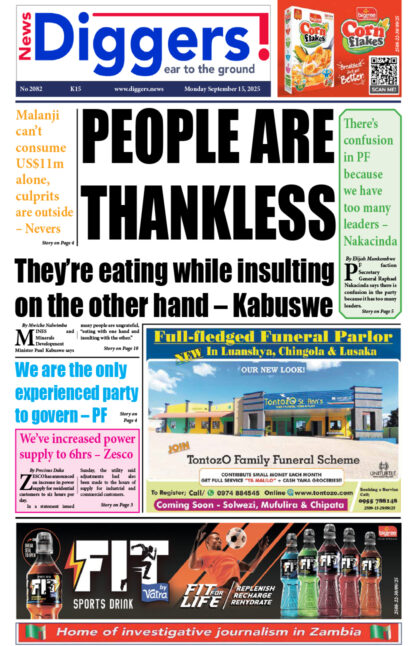The Ministry of Health has directed all provincial health directors, medical superintendents and district health directors across the country to stop engaging in multiple services whilst employed by the Ministry.
In a notice to all government employees working for the Ministry of Health, Permanent Secretary for Administration Dr Kennedy Malama ordered that no public service employee would be allowed to work in any private institution whilst simultaneously employed in public service.
Dr Malama stressed that the directive was with immediate effect and that failure to comply would constitute misconduct and may result in disciplinary action being instituted against erring officers in accordance with the terms and conditions of service for the public service.
“The ministry has noted with concern that public service employees in the health sector, particularly medical personnel, have been engaging themselves in double or multiple employment whilst remaining active servants. You are hereby reminded that in accordance with the terms and conditions of service No. 86 ‘no officer may withdraw a salary for more than one post at the same time’. In this regard, I hereby direct as follows; No medical doctor, nurse , midwife, clinical officer or indeed any other public service employee employed in the Ministry of Health shall be allowed to work in any private institution whether it be a hospital, clinic, pharmacy, academic institution or any other organisation whilst simultaneously employed in public service; and heads of institutions and other supervisors are required to ensure adherence to this directive,” stated Dr Malama.
“It must be particularly noted that, this directive is with immediate effect and failure to comply shall constitute misconduct and shall result in displinary action being instituted against errying officers in accordance with the terms and conditions of service for the public service. Address are requested to bring the contents of this minute to the attention of all officers under their control and supervision.”
But on March 15, Dr Malama told a parliamentary committee on parastatal bodies that there was no policy which barred public service health workers from giving consultancy work to private institutions.
“Moonlighting is permissible, so long someone does moonlighting, it could be a doctor, a pharmacist, a clinic officer within what is allowed. You are off duty, you are on leave, you may do something, so long its not infringing your daily work what you are employed for under government. And as I alluded to, where medicines of products from government premises or institutions find their way in a private outlet, that is a serious offence,” Dr Malama said.
Asked by one of the committee members Mulowa Mukumbuta on what punishment would be given to health officers involved in double dealings of taking medicine from public to private institutions, Dr Malama said stealing of drugs was a convictable offence.
He added that some health workers had been convicted for illegally transferring medical drugs from public to private institutions.
“And we would like to inform the honorable chair of this committee that it is true that some health workers have actually been convicted from that vice. And that is why ourselves we continue to intensify the sensitization, counseling and bringing to the attention of health workers that this is a very serious offence hence the establishment of a tax force which works incognito countrywide to ensure that we highten our suivailance. And no public health worker will be pardoned or special attention given to them in terms of lenience if found wanting in this matter,” Dr Malama explained.
“We are all aware that some of our doctors working in the public sector may also find their time working in the private clinic. As a health sector, we would want to ensure that all public service workers fully apply themselves on the public service work.what I meant was at the moment, we don’t have a policy so to say which says ‘you are a doctor, you cannot do any private practice in a private as a consultance’ for instance as you see them. So if you go any clinic of hospital in Lusaka district for instance, its clear that most of them are driven by public sector consultance working in our hospitals. The health sector would want to move a motion or we would want to move an agenda to say ‘how do we navigate so that our senior doctors spend all their time in the public sector?’ but definitely that will need a lot of support, a lot of engagement and a think through.”
























